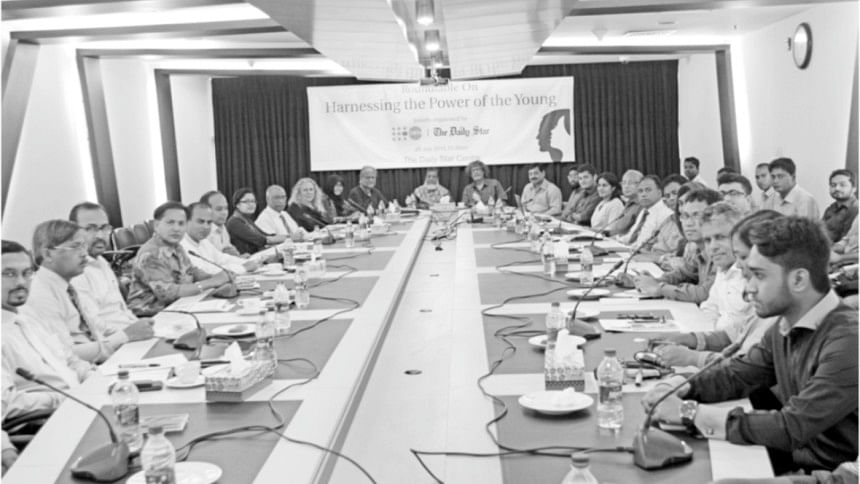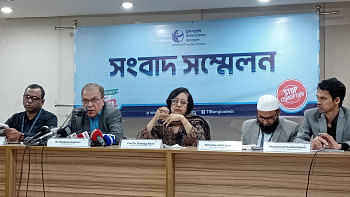Harnessing the Power of the Young

Education:
* The budget allocation for education should be increased.
* The quality of education should be enhanced
* There is a need for more private educational institutions.
* Bridge the gap between different education mediums
* Teachers need to be paid a good salary and given higher benefits.
* There is a need to focus on achieving gender parity in education.
* Educate adolescents on sexual and reproductive health, which should be included in educational curricula.
* Ensure quality training for teachers.
* The education system should focus on market relevant skill development. Identify alternative non-formal education systems for developing skills of young people.
Skill Development:
* Increase the focus on research in relation to skills development.
* Language education should be incorporated in our vocational and technical training programmes.
* Ensure socio-economic protection for young people and create an enabling environment so that they can get skill training and find jobs.
* Support programmes on developing the skills of our migrant workers.
* Establish special language training institutions.
* Ensure madrasas teach modern Arabic to their students, so that these students can migrate to Middle Eastern countries as skilled labour.
* Teach English along with other dominant languages like Arabic, Korean, Chinese, Japanese and French.
* Include entrepreneurship education in our mainstream education curriculum.
Youth:
* Listen to youth, let them be heard, provide them with a platform.
* To transform the future there is no other option than investing in young people.
* Parents should let the children decide their future.
* Be democratic and respect youth opinions instead of imposing our views on them.
* A youth platform should be formed so that youth can raise their voice and share their ideas.
* Parliamentarians can play a big role in harnessing the potential of the youth.
* There is a need for political commitment to ensure youth development.
* Encourage youth to raise their voice against harmful social practices and stigma.
* Young people should be engaged with local government and non-government bodies.
* Discuss with adolescents about Child Marriage and consider their opinion.
* The private sector should come forward and join hand in youth development efforts.
* It is important to ensure decent work and full time jobs for the youth.
* Facilitate self-employment and entrepreneurship among youth.
* Find innovative ways to develop skills amongst youth.
* Create a mechanism for teaching and developing the skills of young workers, especially those from impoverished backgrounds, after regular working hours.
Health:
* Youth and adolescent related health services should be made available in every health centre.
* In local level health institutions there should be a special arrangement for providing health services to young people.
Young People are the most valuable resource of any country” said Chief Guest Md. Fazle Rabbi Miah, Deputy Speaker of the National Parliament Bangladesh at the Round Table that was held at the Daily Star Centre on the 25th of July. With Shahnoor Wahid, Editor of the Special Supplements Division at the Daily Star; acting as the Moderator the roundtable was initiated through a presentation made by Eshani Ruwanpura and Sufian Chowdhury a UNFPA representative and a member of the UN Youth Advisory Panel respectively.
The main focus of their presentation was Bangladesh's population of approximate 52 million young people who present a great opportunity for the country. Having a large population of young people does not mean that a country will automatically enjoy a demographic dividend. A demographic dividend will be possible only when a government invests heavily in education, health, skills development and employment generation, particularly for adolescents and youths.
Bangladesh has made significant progress in increasing its secondary school enrolment rates but this achievement is offset by the high dropout rates, especially amongst adolescent girls. Bangladesh needs to invest more in education, particularly in secondary education and ensure the quality of education. Achieving gender parity in education, especially at secondary and higher education level, is still work in progress that requires a lot of attention.
The participants at the round table included Policy makers, Government officials, and members from the Development Partners, UN agencies and civil society. Subsequent to the presentation, Shahnoor Wahid requested the esteemed panel to share their views and provide any recommendations. The discussion which followed revolved mainly around how the full potential of young population can be utilized. The discussants also recognized current initiatives as well as impediments that the government currently faces when it comes to utilizing this growing potential that is the youth. Participants discussed the means to improve the quality of education and the salary of educators.
The importance of incorporating knowledge on sexual and reproductive rights, including technical education as well as looking at alternative non-formal education systems was also mentioned. This led the discussion to delve further into the value of the youth voice and ways the government can engage the young population in political, social and economic matters.
Many of the participants believed that investing in youth meant more extensive research into offering specialized technical skills that they can benefit from, in their professional career.
Bangladesh faces a unique opportunity that it can benefit from greatly, if the right investments are made. The nation needs to harness this power now if they want financial prosperity to sustain themselves as well as the older population, of Bangladesh, which will also continue to grow. With growing numbers, the young population, if they are empowered well, has the power to make great changes, which can benefit the entire nation.

 For all latest news, follow The Daily Star's Google News channel.
For all latest news, follow The Daily Star's Google News channel. 



Comments